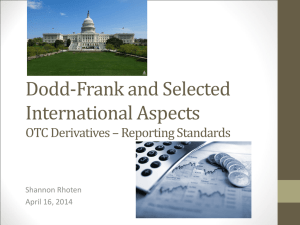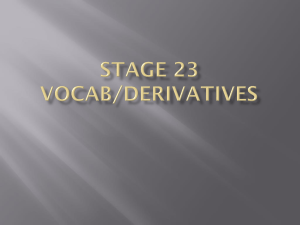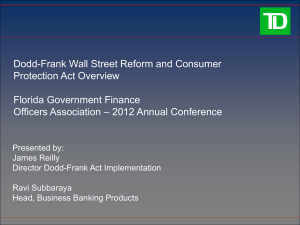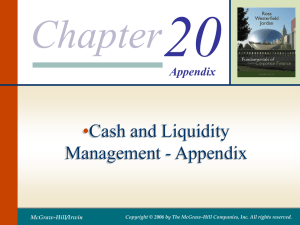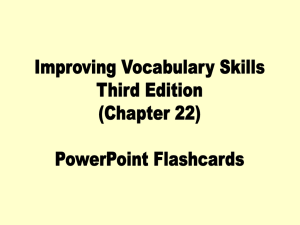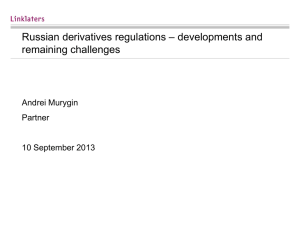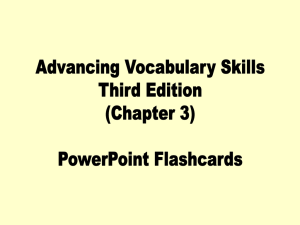Volcker Rule Status Update
advertisement
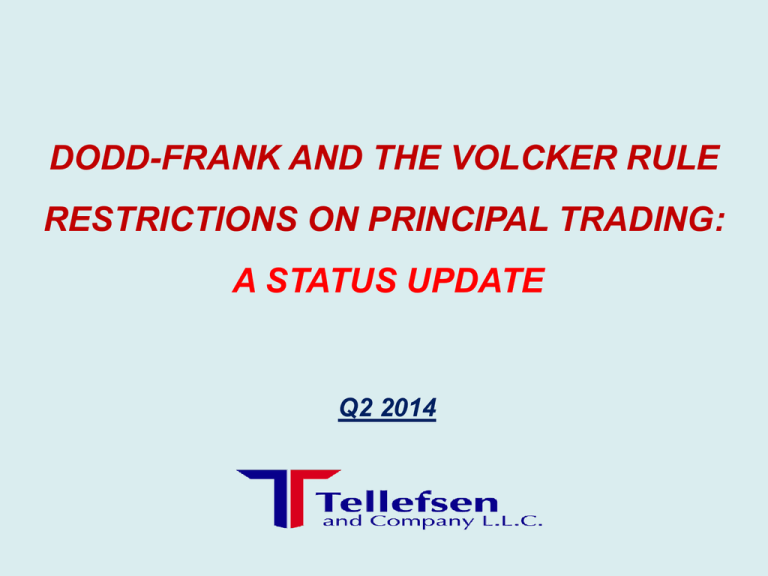
DODD-FRANK AND THE VOLCKER RULE RESTRICTIONS ON PRINCIPAL TRADING: A STATUS UPDATE Q2 2014 The following information was compiled from research and analysis of CFTC and SEC submissions, press releases, information obtained in the public domain , interviews with market participants and from information and bulletins contained on regulatory and legal websites. It is intended to be an update as to the state of proposed rulemaking regarding the restriction s on proprietary trading and market making under the DoddFrank Wall Street Reform and Consumer Protection Act. Tellefsen and Company, L.L.C. does not guarantee the accuracy of the content and cannot guarantee completeness, timeliness, or correct sequencing of any of the Information. Dodd-Frank Act Title VII – OTC Derivatives 2 I. BACKGROUND AND EVOLUTION OF THE VOLCKER RULE • The Dodd-Frank Wall Street Transparency and Accountability Act (“Dodd-Frank”) created a number of environmental impacts on the trading and reporting of securities and commodities based swap transactions • Tellefsen and Company (“TCL”) has been closely following the evolution of Dodd-Frank legislation and the introduction of various Dodd-Frank Title VII milestones over the last few years • The following is an update on the status of Volcker rulemaking by the Federal Reserve, Office of the Comptroller of the Currency, Federal Deposit Insurance Corp., Commodities Futures Trading Commission and the Securities and Exchange Commission. Dodd-Frank Act Title VII – OTC Derivatives 3 VOLCKER EVOLUTION (CONT’D) … • Paul Volcker argued that banks that engage in high-risk speculation created an unacceptable level of systemic risk to the U.S. financial markets • Under Dodd-Frank, Section 619, first published in 2011, addresses prohibitions and restrictions on proprietary trading (“The Volcker Rule” or “Volcker”) • The Volcker Rule is designed to prohibit a bank or institution that owns a bank from engaging in proprietary trading that is not at the behest of its clients, from owning or investing in a hedge fund or private equity fund, and limits the liabilities that the largest banks can hold • Volcker specifically addresses banking firms’ principal, proprietary and market making activities. Dodd-Frank Act Title VII – OTC Derivatives 4 VOLCKER EVOLUTION (CONT’D) … • Major Wall Street banks generate a large percentage of revenue from principal trading: – Goldman Sachs and Morgan Stanley: ~ 30% – JP Morgan Chase: ~ 12% – Bank of America and Citigroup: <10% • According to Bloomberg, these 5 firms generate ~$44 billion USD (18% of their annual revenue) from market making operations • In anticipation, many banks have shuttered or spun off their proprietary trading units over the last 2 years • Many have indicated that they do not expect that implementation of and adherence to Volcker will have a significant impact on their profits • U.S. regulators have just voted on the adoption of the current iteration of the Volcker Rule, which become effective in April 2014. Dodd-Frank Act Title VII – OTC Derivatives 5 II. THE VOLCKER RULE: IN A NUTSHELL • The Volcker Rule would prohibit certain proprietary or principal trading by federally insured institutions and their affiliates, restrict bank ownership in certain hedge funds or private equity funds and restrict certain transactions with affiliates • Depository institutions would be prohibited from: – Engaging in “proprietary trading” – Acquiring or retaining equity or ownership interest in a hedge fund or private equity fund – Sponsoring a hedge fund or private equity fund • These restrictions would apply to the proprietary trading and fund activities of U.S. banking organizations, regardless of where they are conducted. Dodd-Frank Act Title VII – OTC Derivatives 6 VOLCKER - IN A NUTSHELL (Cont’d) … • Non-bank financial companies would not be subject to this prohibition, but could be subject to provide additional capital requirements, compliance oversight and quantitative limits • Volcker defines proprietary trading as when banking firms are engaged as principal for the trading account of a banking organization or supervised non-bank financial company in any transaction to purchase, sell or otherwise dispose of any: – – – – – Securities Derivatives Contract of sale of commodities for future delivery Options on securities, derivatives or contracts Other securities of financial instruments that regulators may determine by rule. Dodd-Frank Act Title VII – OTC Derivatives 7 VOLCKER - IN A NUTSHELL (Cont’d) … • Volcker would prohibit banking entities from entering into any transaction or engaging in any activity that would: – – – – Result in a material exposure to high-risk assets or high-risk trading strategies Involve or result in a material conflict of interest Pose a threat to the safety and soundness of the banking entity Pose a threat to the financial stability of the US • According to SIFMA, Volcker-compliance would have significant impact on the ability of US banking institutions to provide investment management products and services that are competitive with nonbanking firms and with non-US banking firms in oversees markets: – Investors will face decreased market liquidity and higher costs – Companies will find it more expensive to raise capital, making it more costly to invest in plants and equipment and create jobs. Dodd-Frank Act Title VII – OTC Derivatives 8 III. PRINCIPAL / PROPRIETARY TRADING AND MARKET MAKING • Volcker would prohibit any insured firm and its affiliates from engaging in proprietary trading in any: – – – – – Securities Derivatives Contract of sale of commodities for future delivery Options on securities, derivatives or contracts Other securities of financial instruments that regulators may determine by rule • Volcker would permit certain trading transactions: – In government securities – In connection with market making or underwriting, to the extent it does not exceed near term demands of clients, customers or counterparties – On behalf of customers – By an insurance business for the general account of the insurance company. Dodd-Frank Act Title VII – OTC Derivatives 9 PRINCIPAL / PROPRIETARY TRADING AND MARKET MAKING (Cont’d) … • Volcker exempts transactions in certain instruments from the proprietary trading prohibitions, including: – US government and US government agencies – Government-sponsored enterprises – State and local governments • Volcker would also exempt activities such as: – Market-making – Underwriting – Risk-mitigating hedging • Other Volcker exemptions encompass: – Organizing and offering a hedge fund or private equity fund under certain conditions, including limiting investments to a de minimis amount – Making risk mitigating hedging investments – Making investments in certain non-US funds. Dodd-Frank Act Title VII – OTC Derivatives 10 PRINCIPAL / PROPRIETARY TRADING AND MARKET MAKING (Cont’d) … • Under Volcker, banking entities would be required to establish an internal compliance program to ensure and monitor compliance with the prohibitions and restrictions and the implementation of the regulations • This would include written supervisory procedures. Dodd-Frank Act Title VII – OTC Derivatives 11 IV. FUND OWNERSHIP INTEREST • Volcker places certain restrictions on bank’s ownership or interest in hedge funds or private equity funds (“covered funds”) • They may organize and offer a hedge fund or private equity fund if it: – Provides trust, fiduciary or investment advisory services and the fund is organized and offered only in connection with such services and only to customers of such services – Does not have an ownership interest in the fund except for a seed or de minimis investment – Complies with Dodd-Frank Sections 23A and 23B affiliate transaction limitations – Does not guarantee, assume or otherwise insure obligations of performance of the fund – Does not share the same name or similar name as the fund – Prohibits directors or employees from having an ownership interest in the fund, except for any director or employee who is directly providing investment advisory or other services to the fund – Discloses in writing, to investors that any losses in the fund are borne solely by the investors. Dodd-Frank Act Title VII – OTC Derivatives 12 FUND OWNERSHIP INTEREST (Cont’d) .. • If banking entities make a seed investment in a fund, they must seek unaffiliated investors to reduce or dilute the investment to not more than 3% of total ownership interest of the fund within one year after the establishment of the fund • In addition, the aggregate investment in all the investment interests in such funds may not exceed 3% of the Tier I capital of the banking entity • The exception to this are that foreign banking entities may operate without regard to Volcker, provided that no ownership interest in such fund is offered for sale or sold to a U.S. resident. Dodd-Frank Act Title VII – OTC Derivatives 13 V. AFFILIATED TRANSACTIONS • Volcker prohibits banking entities and their affiliates that manage sponsor or organize and offer a fund from entering into Section 23A covered transactions (loans to the fund and asset purchases from the fund) with such funds • Exemptions to Section 23A may be granted for the purposes of entering into any prime brokerage transactions with a fund that the bank manages, sponsors or advises has an equity, partnership or other ownership interest: – Transactions are permitted involving prime brokerage with funds in which a fundof-funds has invested. Dodd-Frank Act Title VII – OTC Derivatives 14 AFFILIATED TRANSACTIONS (Cont’d) … • This exemption would be granted if: – The bank complies with Volcker’s exception for sponsoring or making seed or de minimis investments in funds – The CEO or equivalent officer annually certifies in writing that the banking entity does not guarantee, assume or otherwise insure the obligations or performance of the fund or any other fund in which such fund invests – Regulators determine that such a transaction is consistent with the safe and sound operation and conditions of the banking entity. Dodd-Frank Act Title VII – OTC Derivatives 15 V. GOING FORWARD … • There are numerous problems with the implementation of Volcker that are still being discussed – the unintended consequences of Dodd-Frank Title VII • The primary enforcement of Volcker will lie with bank examiners, many of which may not have much experience with trading practices and complex products • Banks will have to defend their transactions or exemptions on a case-by-case basis to regulators • There will be overlapping supervisory conflicts in enforcing Volcker, as firms would be subject to oversight by 5 regulators, which all do not have the same enforcement processes or standards. Dodd-Frank Act Title VII – OTC Derivatives 16 GOING FORWARD (Cont’d) … • Volcker will place tight restrictions on liquidity management • Banks’ requirements to request and defend exemptions to the rules will involve changes to their trading and compliance programs, data capture and procedures • Banks will have to implement or enhance various metrics to capture and calculate compliance on a daily basis including, but not limited to: VaR, detailed P&L, inventory risk turnover, customer facing trade ratios, fee income and expenses, unprofitable trading days based on portfolio P&L, etc. • Banks must pay close attention to their impacted businesses and evolution of key Volcker milestone dates. Dodd-Frank Act Title VII – OTC Derivatives 17 VI. PREPARING FOR VOLCKER… • Volcker will have an impact on those banks that are involved with trading, hedging and underwriting activities • Compliance will phased in over time, starting in April 2014. • The following are the touch points that must be considered for Volcker compliance: – Identify overall business impacts, touch points for prohibited activities and relevant data capture requirements – Conduct a comprehensive review of trading, hedging and underwriting businesses for the required Volcker reporting thresholds – Assess market making and underwriting businesses and need for any exemptions – Assess any lending or leasing hedging risk requirements and data to be captured for compliance – Review/update compliance manuals and written supervisory procedures. Dodd-Frank Act Title VII – OTC Derivatives 18 MARKET MAKING EXEMPTION • The market-making exemption has received the most press coverage and commentary, largely because it will be the most difficult for examiners to verify. • Partly for that reason the rule specifies seven metrics that large banks must start capturing and keeping as of July 1, 2014. They are: 1. 2. 3. 4. 5. 6. 7. Risk and Position Limits and Usage; Risk Factor Sensitivities; Value-at-Risk and Stress VaR; Comprehensive Profit and Loss Attribution; Inventory Turnover; Inventory Aging; and Customer-Facing Trade Ratio Evolution of U.S. Financial Markets 19 STILL CONFUSED ABOUT THE VOLCKER RULE? I'm Chris, He’s Barney …. Dodd-Frank Act Title VII – OTC Derivatives 20 Contact Us for More Market Insight! Tellefsen and Company, L.LC. 1-212 809 3800 JJR@Tellefsen.com Dodd-Frank Act Title VII – OTC Derivatives 21
